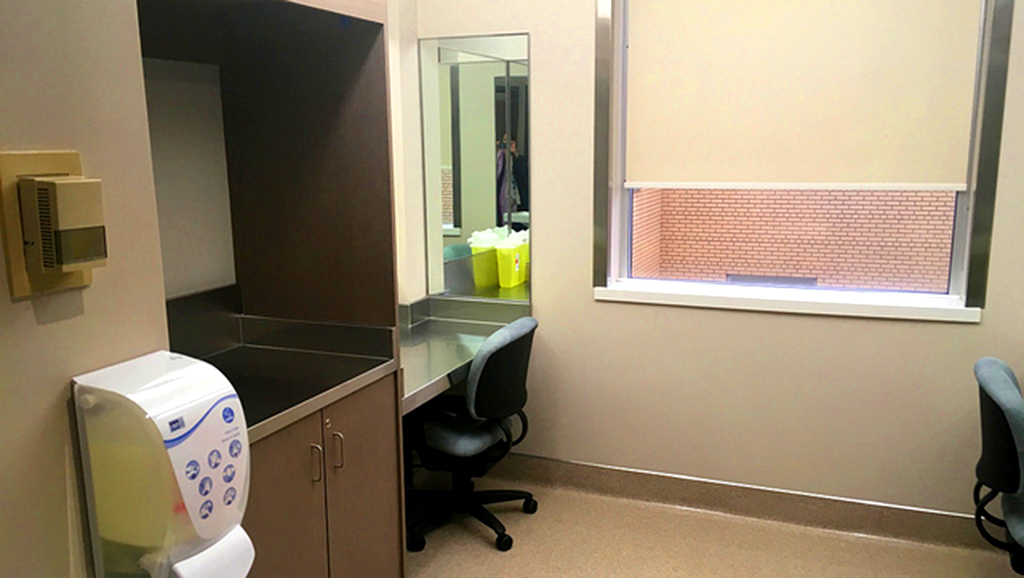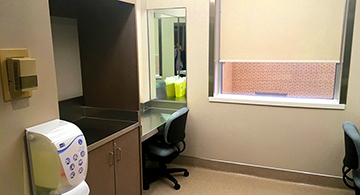The Royal Alexandra Hospital will open the first hospital-based supervised consumption service in North America on April 2.

Patients will benefit from the lifesaving supports offered by these services, including greater access to treatment and mental-health supports.
“It’s important we do everything we can to support individuals and families affected by the opioid crisis. Supervised consumption sites provide a secure, supportive place for people who use substances, while also being connected with wraparound services such as counselling and treatment programs. The addition of this new lifesaving service at the Royal Alex not only means greater safety for patients; it also supports a safer hospital environment for staff and visitors.”
– Sarah Hoffman, Minister of Health
After a site inspection was held earlier this month, Alberta Health Services received final approval from Health Canada to open the unit. The unit will be open 24 hours a day, seven days a week and can provide services for six patients at any given time. Nurses will be on staff to provide lifesaving services, including naloxone, in case of an overdose. Patients will also have access to their doctor, counsellors, social workers and peer-support workers for additional services, including mental-health supports, social work and opioid-dependency treatment.
“Edmonton has once again shown its innovation by being the first city in North America to have a site like this within a hospital. This model will not just save lives in Edmonton but will help other vulnerable individuals from other cities as other leaders learn and possibly apply how it can be done.”
– Don Iveson, mayor, Edmonton
“Providing supervised consumption services for our inpatients ensures that individuals have access to evidence-based health interventions across the health-care spectrum. Hospitals can be high-risk environments for people who use drugs. The service will help identify patients at risk, engage them into care and connect them to the Addiction Recovery and Community Health (ARCH) team, a multidisciplinary team focused on the treatment of substance use disorders, health promotion and stabilization of the social determinants of health.”
– Dr. Kathryn Dong, director of the Addiction Recovery and Community Health (ARCH) program at the Royal Alexandra Hospital
Evidence shows supervised consumption services save lives, reduce transmission of infections by providing sterile needles and equipment and enhance community safety by reducing public substance use and discarded needles.
“Our son Danny was alone when he overdosed, and he could not be saved. As mothers and families, we want to keep our loved ones alive and as healthy as possible until they can arrive at a place in their lives where treatment works for them. This supervised consumption site will help us achieve that outcome. These services are about keeping people alive and building relationships. Within the hospital setting, health professionals can reach out to individuals who might otherwise not seek help, and connect them with harm reduction, treatment and social services.”
– Petra Schulz, co-founder, Moms Stop the Harm
Providing supervised consumption services is part of the province’s urgent work to address the opioid crisis. Last year, 562 people in Alberta died of apparent fentanyl poisonings, including 135 people in Edmonton.
“Substance use disorders are chronic, relapsing conditions that don’t necessarily stop with hospitalization. Inpatients who use substances should have access to the same evidence-based harm-reduction services available in the community. In offering a supervised consumption service, the Royal Alex is cementing its reputation as a national leader in the care of patients with substance use disorders, and sending a strong message that all people deserve compassionate, non-judgmental treatment and health-care services.”
– Dr. Elaine Hyshka, co-chair, Minister’s Opioid Emergency Response Commission
“People who need help with their substance use are more likely to get the help they need when they feel supported and cared for. Supervised consumption services like the one at the Royal Alexandra Hospital are a compassionate, comprehensive, and collaborative form of evidence-based care and provide options when clients are ready for change.”
– Dr. Verna Yiu, president and CEO, Alberta Health Services
Quick facts
Health Canada has approved six supervised consumption sites in Alberta:
A permanent location in the Sheldon M. Chumir Health Centre began offering services Jan. 15, 2018, taking over from a temporary site that opened in late October. The site has had almost 6,900 client visits up to the end of February, and there have been 119 overdose reversals.
- ARCHES, a harm-reduction agency in Lethbridge, opened its supervised consumption site Feb. 28, 2018. It serves between 90 and 100 people each day. Staff have reversed 10 overdoses so far.
- Access to Medically Supervised Injection Services Edmonton opened its first of three supervised consumption services in Edmonton’s Boyle Street Community Services March 23. Preparations are underway to open additional sites in the George Spady Centre and Boyle McCauley Health Centre.
- The Minister’s Opioid Emergency Response Commission has also endorsed proposals by community-based harm-reduction agencies to apply for federal exemptions for mobile supervised consumption services in Calgary and Grande Prairie and fixed sites in Medicine Hat and Red Deer.
The government has also opened new opioid dependency treatment clinics in communities across the province. New spaces in Calgary, Edmonton, Grande Prairie, Cardston, central Alberta, Sherwood Park and Fort McMurray help an additional 3,500 people every year to receive this treatment.
The government is also working to expand the number of naloxone kits distributed across the province. As of Feb. 28, 2018, almost 50,000 free naloxone kits have been distributed and more than 3,300 overdose reversals have been voluntarily reported.
Media inquiries
Laura Ehrkamp
780-721-9795
Press Secretary, Minister of Health
Shelly Willsey
780-394-0905
Senior Communications Advisor, Alberta Health Services


